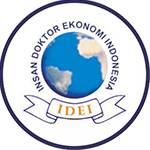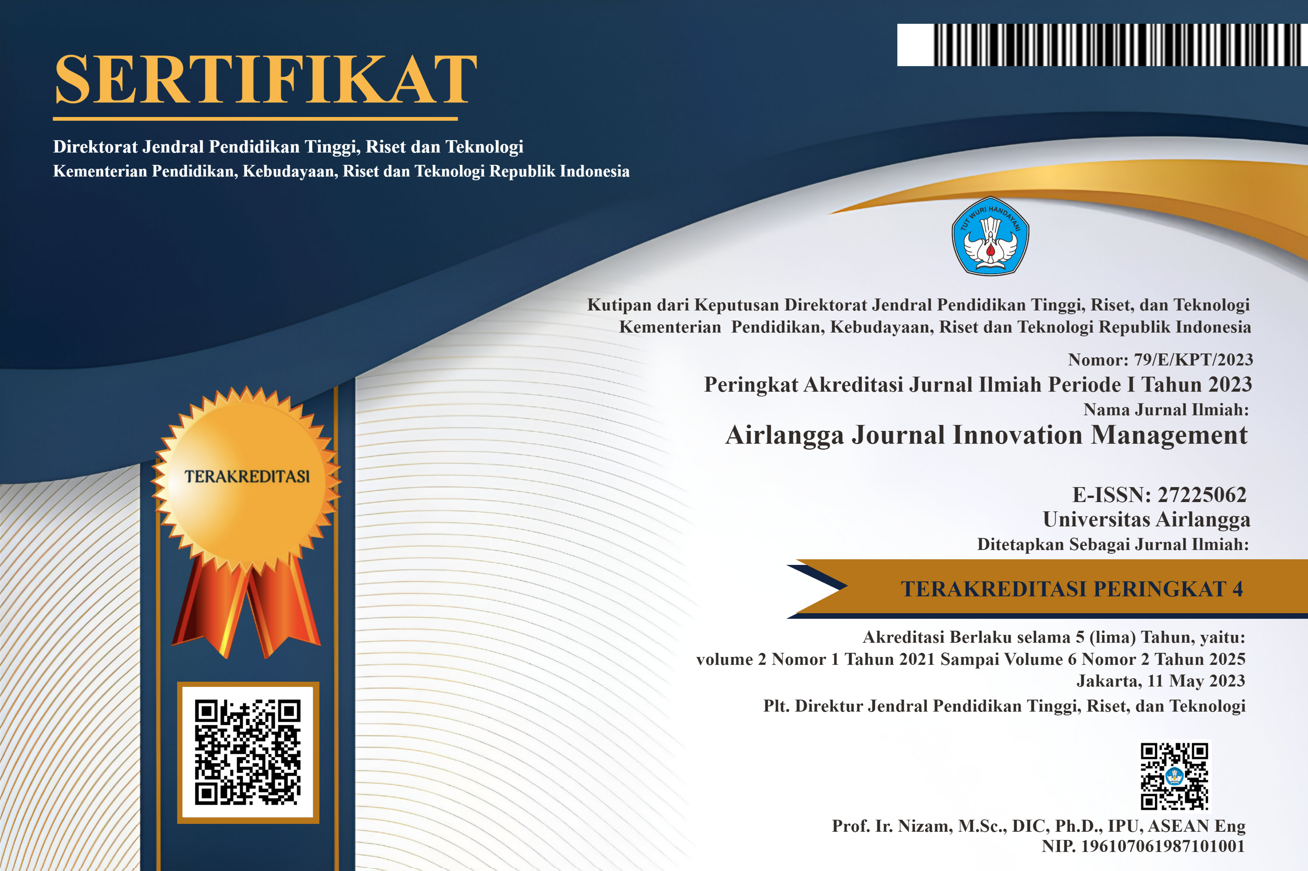The Impact of Islamic Fintech on Poverty Alleviation in Indonesia: A Socio-Economic Implications
Downloads
Poverty alleviation remains a critical focus in Indonesia's agenda alongside technological advancement. The establishment of an inclusive Islamic financial ecosystem, integrating digital financial services (fintech), stands as a significant initiative. However, challenges including regulatory inadequacies, complex licensing, misuse in terrorism financing, and consumer disputes plague this evolving landscape. This study investigates the impact of Islamic fintech on poverty reduction from 2005 to 2022, utilizing an Ordinary Least Squares (OLS) model. Results indicate that Islamic fintech interventions exhibit promise in mitigating poverty while strengthening the financial system. This underscores the pivotal role of the financial infrastructure in societal welfare development. Compared to mere economic growth, Islamic fintech demonstrates potential for sustained socio-economic development, particularly aiding Shariah-compliant enterprises seeking expansion. The findings emphasize the necessity of addressing regulatory intricacies to fully harness the transformative potential of Islamic fintech. This study underscores the significance of fostering an enabling regulatory environment, contributing to Indonesia's long-term socio-economic development and poverty alleviation strategies.
Cindy, S., Mohammad, B. L., & Teguh, S. I. (2019). Banking and financial technology (fintech) Islamic integration with collaborative models. Russian Journal of Agricultural and Socio-Economic Sciences, 91(7), 102–111.
Dranev, Y., Frolova, K., & Ochirova, E. (2019). The impact of fintech M&A on stock returns. Research in International Business and Finance, 48, 353–364.
Firdaus, F., Febiola, A., & Faiqoh, S. (2017). Ketegasan regulasi laporan ketaatan syariah dalam optimalisasi financial technology lembaga keuangan syariah. Perisai: Islamic Banking and Finance Journal, 1(3), 227–272. https://doi.org/10.21070/perisai.v1i3.1173
Fu, J., Liu, Y., Chen, R., Yu, X., & Tang, W. (2020). Trade openness, internet finance development and banking sector development in China. Economic Modelling, 91, 670–678.
Fünfgeld, B., & Wang, M. (2009). Attitudes and behaviour in everyday finance: evidence from Switzerland. International Journal of Bank Marketing, 27(2), 108–128.
Guo, F., Wang, J., Cheng, Z., Li, Y., Wang, F., & Wei, A. (2019). The Peking University Digital Financial Inclusion Index of China (2011-2018). Institute of Digital Finance, Peking University, April, 1–70.
Hadad, M. D. (2017). Financial technology (FinTech) di Indonesia: Kuliah umum tentang FinTech-IBS. http://www.ibs.ac.id/img/doc/MDH%20-%20FinTech%20IBS%20June%202017.pdf
Hiyanti, H., Nugroho, L., Sukmadilaga, C., & Fitrijanti, T. (2020). Sharia fintech (financial technology) opportunities and challenges in Indonesia. Jurnal Ilmiah Ekonomi Islam, 5(3), 326–333.
Laut, L. T., & Hutajulu, D. M. (2019). Kontribusi Financial Technology dalam Meningkatkan Inklusi Keuangan di Indonesia. Prosiding Seminar Nasional Fakultas Ekonomi Untidar 2019.
Lee, I., & Shin, Y. J. (2018). Fintech: Ecosystem, business models, investment decisions, and challenges. Business Horizons, 61(1), 35–46.
Maulida, S., Hasan, A., & Umar, M. (2020). Implementasi Akad Pembiayaan Qard dan Wakalah bil Ujrah pada Platform Fintech Lending Syariah ditinjau Berdasarkan Peraturan Otoritas Jasa Keuangan (OJK) dan Fatwa DSN-MUI. Al-Tijary, 175–189.
Muchlis, R. (2018). Analisis SWOT Financial Technology (Fintech) Pembiayaan Perbankan Syariah Di Indonesia (Studi Kasus 4 Bank Syariah Di Kota Medan). AT-TAWASSUTH: Jurnal Ekonomi Islam, 1(1), 335–357.
Muzdalifa, I., Rahma, I. A., Novalia, B. G., & Rafsanjani, H. (2018). Peran fintech dalam meningkatkan keuangan inklusif pada UMKM di Indonesia (pendekatan keuangan syariah). Jurnal Masharif Al-Syariah: Jurnal Ekonomi Dan Perbankan Syariah, 3(1), 1–24.
Ningsih, D. R. (2020). Peran Financial Technology (Fintech) Dalam Membantu Perkembangan Wirausaha UMKM. Prosiding Seminar Nasional Program Pascasarjana Universitas PGRI Palembang.
Ozili, P. K. (2018). Impact of digital finance on financial inclusion and stability. Borsa Istanbul Review, 18(4), 329–340.
Perera, L. D. H., & Lee, G. H. Y. (2013). Have economic growth and institutional quality contributed to poverty and inequality reduction in Asia? Journal of Asian Economics, 27, 71–86.
Quartey, P. (2008). Financial sector development, savings mobilization and poverty reduction in Ghana. Springer.
Rabbani, M. R., Ali, M. A. M., Rahiman, H. U., Atif, M., Zulfikar, Z., & Naseem, Y. (2021). The response of Islamic financial service to the Covid-19 pandemic: The open social innovation of the financial system. Journal of Open Innovation: Technology Market, and Complexity, 7(1), 1–17. https://doi.org/10.3390/joitmc7010085.
Rabbani, M. R., Bashar, A., Nawaz, N., Karim, S., Ali, M. A. M., Rahiman, H. U., & Alam, M. S. (2021). Exploring the role of Islamic FinTech in combating the aftershocks of Covid-19:The open social innovation of the Islamic financial system. Journal of Open Innovation: Technology Market, and Complexity, 7(2), 1–19. https://doi.org/10.3390/joitmc7020136.
Santi, E., Budiharto, B., & Saptono, H. (2017). Pengawasan otoritas jasa keuangan terhadap financial technology (peraturan otoritas jasa keuangan nomor 77/pojk. 01/2016). Diponegoro Law Journal, 6(3), 1–20.
Seven, U., & Coskun, Y. (2016). Does financial development reduce income inequality and poverty? Evidence from emerging countries. Emerging Markets Review, 26, 34–63.
Trimulato, T., Nafis, M. C., & Amalia, E. (2022). The Role Sharia Fintech Support Sustanaible Development Goals Program (SDGs). Jurnal Ilmiah Ekonomi Islam, 8(1), 251-259.
Uddin, G. S., Shahbaz, M., Arouri, M., & Teulon, F. (2014). Financial development and poverty reduction nexus: A cointegration and causality analysis in Bangladesh. Economic Modelling, 36, 405–412. https://doi.org/10.1016/j.econmod.2013.09.049
Wang, X., & He, G. (2020). Digital financial inclusion and farmers' vulnerability to poverty: Evidence from rural China. Sustainability, 12(4), 1668.
Zhang, X., Zhang, J., Wan, G., & Luo, Z. (2020). Fintech, growth and inequality: evidence from China's household survey data. The Singapore Economic Review, 65(supp01), 75–93.
Copyright (c) 2023 Airlangga Journal of Innovation Management

This work is licensed under a Creative Commons Attribution-NonCommercial-ShareAlike 4.0 International License.
- The journal allows authors to hold copyright without restrictions and retain publication rights without restrictions. The author retains the copyright and grants the first publication rights to the journal, with his work simultaneously licensed under the Creative Commons Attribution-NonCommercial-ShareAlike 4.0 International License (CC BY-NC-SA). This license allows others to share the work with acknowledgment of authorship and initial publication in this journal, provided that the work is not used for commercial purposes and that any derivative works must use the same license.
- Authors may enter into additional contractual agreements for non-exclusive distribution of the journal publication version (e.g., uploading it to an institutional repository or publishing it in book form), while still including acknowledgment of the initial publication in this journal.
- Authors are allowed and encouraged to upload their work online (e.g., in an institutional repository or personal website) before and during the submission process. This can support productive scientific exchanges as well as increase citations to published works.

AJIM by UNAIR is licensed under a Creative Commons Attribution-NonCommercial-ShareAlike 4.0 International License.





















